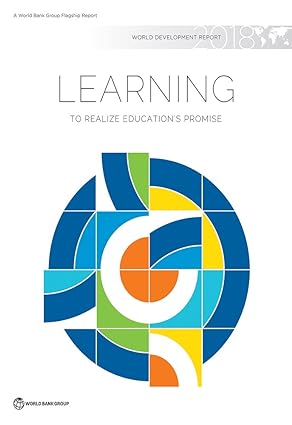World Development Report 2018: Learning to Realize Education's Promise
Every year, the World Banks World Development Report (WDR) features a topic of central importance to global development. The 2018 WDRLEARNING to Realize Educations Promiseis the first ever devoted entirely to education. And the time is right: education has long been critical to human welfare, but it is even more so in a time of rapid economic and social change.
World Development Report 2018: Learning to Realize Education's Promise
Every year, the World Bank’s World Development Report (WDR) features a topic of central importance to global development. The 2018 WDR―LEARNING to Realize Education’s Promise―is the first ever devoted entirely to education. And the time is right: education has long been critical to human welfare, but it is even more so in a time of rapid economic and social change. The best way to equip children and youth for the future is to make their learning the center of all efforts to promote education.
The 2018 WDR explores four main themes:
- First, education’s promise: education is a powerful instrument for eradicating poverty and promoting shared prosperity, but fulfilling its potential requires better policies―both within and outside the education system.
- Second, the need to shine a light on learning: despite gains in access to education, recent learning assessments reveal that many young people around the world, especially those who are poor or marginalized, are leaving school unequipped with even the foundational skills they need for life. At the same time, internationally comparable learning assessments show that skills in many middle-income countries lag far behind what those countries aspire to. And too often these shortcomings are hidden―so as a first step to tackling this learning crisis, it is essential to shine a light on it by assessing student learning better.
- Third, how to make schools work for all learners: research on areas such as brain science, pedagogical innovations, and school management has identified interventions that promote learning by ensuring that learners are prepared, teachers are both skilled and motivated, and other inputs support the teacher-learner relationship.
- Fourth, how to make systems work for learning: achieving learning throughout an education system requires more than just scaling up effective interventions. Countries must also overcome technical and political barriers by deploying salient metrics for mobilizing actors and tracking progress, building coalitions for learning, and taking an adaptive approach to reform.
About the Author
The World Bank came into formal existence in 1945 following the international ratification of the Bretton Woods agreements. It is a vital source of financial and technical assistance to developing countries around the world. The organization's activities are focused on education, health, agriculture and rural development, environmental protection, establishing and enforcing regulations, infrastructure development, governance and legal institutions development. The World Bank is made up of two unique development institutions owned by its 185 Member Countries. The International Bank for Reconstruction and Development (IBRD) focuses on middle income and creditworthy poor countries and the International Development Association (IDA), which focuses on the poorest countries in the world.
| Book | |
|---|---|
| Author | World Bank |
| Year | 2017 |
| ISBN | 9781464810961 |
| Publisher | The World Bank |
| Language | English |
| Uncategorized | |
| Edition | 1/e |
| Weight | 590 g |
| Dimensions | 20.32 x 26.42 x 1.27 cm |
| Binding | Paperback |


